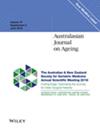Dietitians' perceptions of employment models used in Australian residential aged care facilities
Abstract
Objectives
The qualitative study aimed to explore dietitians' perceptions of employment status and engagement models with residential aged care facilities (RACF) and the impact on work activities and resident care.
Methods
Dietitians currently working in RACF were recruited through convenience and snowball sampling, including contacting a list of dietitians who had previously consented to be contacted for research. A semi-structured interview guide was developed by the research team, pilot-tested and then used in each individual interview. Data were analysed using constant comparison and reflexive thematic analysis.
Results
Thirty-one dietitians (n = 29 female; median age, 39 years) with a range of experience working in different employment status and engagement models in RACF participated in an interview. Five themes were identified: (1) Being an employee allows for better integration and utilisation in the RACF, (2) Contract work creates a scarcity of time, (3) Ad hoc work does not meaningfully address nutrition challenges and may not be good for resident care, (4) Regularly scheduled visits support positive outcomes for residents and (5) Acknowledging many different employment models.
Conclusion
Characteristics of engagement models likely affect dietitian work job satisfaction, individual resident care and food service in RACF. Regular dietetic engagement in RACFs is required to support resident-centred evidence-based dietetic practice and to improve residents' nutrition care. There is an opportunity for policy mandates to assist RACFs in regularly engaging a dietitian to ensure all residents have access to timely, high-quality nutrition care.


 求助内容:
求助内容: 应助结果提醒方式:
应助结果提醒方式:


